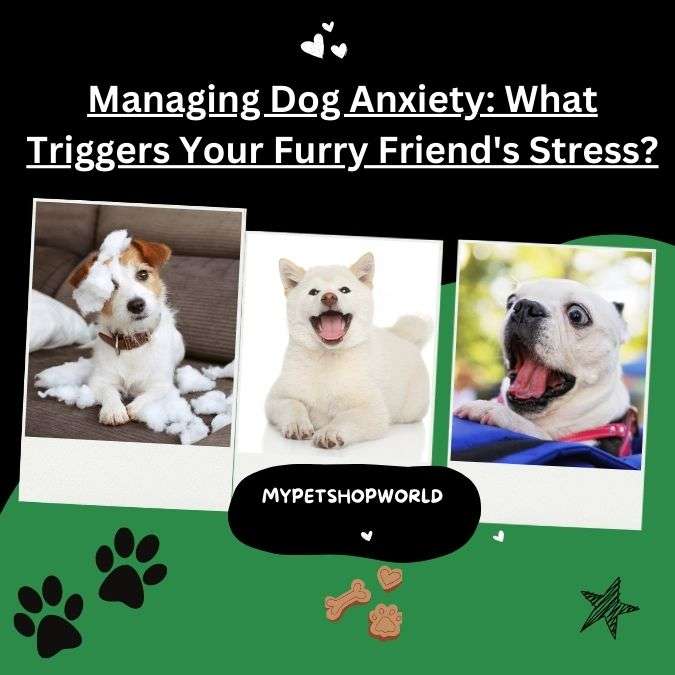

Different types of anxiety in dogs include separation anxiety, noise phobia, and social anxiety. Just like us, dogs can be totally fine one moment and a ball of nerves the next. Each type of anxiety has its unique triggers and symptoms that can leave your pup feeling uneasy. Dog anxiety should be taken serious. Help your dog to overcome it.
Our furry friends, our dogs, often mirror our emotions. But what happens when those emotions shift from joy to fear and anxiety? Understanding the root causes of dog anxiety is crucial for providing the best possible care. Ensuring a happy, healthy life for our canine companions.
Biological factors like genetics can play a role in making certain pooches more prone to anxiety. Just as some humans may have naturally higher levels of stress, some breeds might be wired to be more anxious. On the flip side, environmental factors also weigh in heavily. A chaotic home or major life changes. As well as moving home or a new family member can stir up distress.
Past experiences or trauma can leave a lasting impact on a dog’s emotional weather. Dogs who have gone through tough times, like abusive situations or abandonment, might be more sensitive to stressors down the road. Unresolved trauma is one of those non-visible scars that takes mindful care to heal.
Certain breeds are naturally more high-strung than others. There’s a reason why some breeds like the Border Collie or the Chihuahua often find themselves on the ‘most anxious dogs’ lists.
However,recognizing and understanding your dog’s breed tendencies not only builds empathy but gives you a leg up in managing their anxiety.
Identifying the root cause of your dog’s anxiety is the first step towards effective management. Common signs of anxiety in dogs include:
Adjusting your dog’s diet can significantly impact their anxiety levels. Foods rich in Omega-3 fatty acids, found in fish like salmon, can lend a helping paw by boosting brain health and mood. It’s amazing how a simple dietary tweak can lead to a calmer canine.
Herbal supplements and essential oils like lavender and chamomile are go-to natural remedies. While these can be soothing, it’s crucial to use them correctly and consult your vet first. Not every dog reacts the same, so you’d want to make sure your natural approach is safe and effective.
Creating a calming atmosphere at home makes a big difference. Familiar scents and comfy safe spaces can help dogs unwind. Imagine how relaxing a designated ‘chill zone’—quiet, cozy, and scent-filled—could feel after a long, barking day.
Regular exercise works wonders for anxiety. It might sound basic, but daily walks or play sessions can tire out and satisfy a dog’s natural instincts, acting like stress-busting activity. A sleepy dog is typically a happy, relaxed dog.
Gentle approaches often revolve around consistency. Having a set routine provides stability, helping your dog anticipate and feel secure about what’s coming next. Routines can be calming when everything else seems too much for your furry friend.
Handling an anxious dog requires a balance between empathy and assertiveness. It’s important to remain calm and reassuring without accidentally reinforcing their anxiety. Emotional support? Absolutely! But mirroring their stress isn’t gonna help either of you.
Positive reinforcement through behavioral training is a game-changer. Celebrating small victories and encouraging good behavior with treats or praise can massively boost your dog’s confidence. With time and consistency, you’ll likely see improvements you didn’t expect.
Positive reinforcement through behavioral training is a game-changer. Celebrating small victories and encouraging good behavior with treats or praise can massively boost your dog’s confidence. With time and consistency, you’ll likely see improvements you didn’t expect.
Understanding canine body language can prevent miscommunications. Dogs have their ways of showing stress—like tucked ears, yawning, or lip licking—that can signal they’re overwhelmed. The better you read these signs, the quicker you can intervene and soothe your pet before anxiety spikes.
A regular schedule is like comfort food for an anxious dog. Consistency is key, so feeding, walking, and bedtime should ideally happen around the same time every day. This predictability will help reduce anxiety since your pup learns exactly what to expect.
Calming collars, stress-reducing toys, ADAPTIL Calm Home Diffuser and comfort wearables are some cool gadgets out there to help anxious dogs. These products often use soothing pheromones or gentle pressure to chill your dog out. Just like a soft blanket on a rainy day, these can be comforting for your pet.
Tech plays its part too. White noise machines or music specifically designed for dogs can mask scary sounds like thunder or fireworks. It’s like creating a protective bubble of sound that helps block out those nerve-wracking noises.
Consulting a veterinarian before trying new products is a smart move. Not every gadget is a fit for all dogs, and your vet can give you tailored advice to suit your furry friend’s needs. Their professional insight can guide you to products that truly work rather than ones with just fancy marketing claims.
Remember: Anxiety in dogs is a complex issue. By working closely with your veterinarian and a qualified dog trainer, you can provide your furry friend with the support they need to live a happy and stress-free life.
Disclaimer: This information is for general knowledge and informational purposes only and does not constitute medical advice. Always consult with a qualified veterinarian for any health concerns related to your pet
How Do You Know When Your Dog Nearing Death? Understanding the Signs The soft thump-thump-thump…
Saying Goodbye. A Cat's final stages and how to offer comfort My heart still aches…
Decoding Your Animal Chakras: A Kinesiology Guide to Harmony & Wellbeing Discover to decode animal…
Keeping Your Furry Friend Healthy and Happy. Health Issues in Dogs. As a dog owner,…
The Power of Fostering Pets. Become a Forster Parent. Imagine this: a scared, trembling dog…
11 Common Human Foods That Can Endanger Your Dog. Dogs are little opportunists when it…